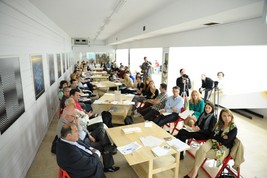Active projects
Active researches
Active evaluations
Young researchers: It is all in state strategies, but nothing concrete has been done yet
Release date: 02.06.2014.
 The main conclusion of the participants of the round table “Young researchers: position and opportunities“, organized on May 30 in the Centre for the Promotion of Science, is that the problems encountered by young researchers are mostly recognized in state documents, but few concrete steps are taken in order to resolve those problems. The round table, organized by the Institute of Economic Sciences, gathered more than fifty young researchers, university representatives, scientific institutes, non-governmental and international organisations.
The main conclusion of the participants of the round table “Young researchers: position and opportunities“, organized on May 30 in the Centre for the Promotion of Science, is that the problems encountered by young researchers are mostly recognized in state documents, but few concrete steps are taken in order to resolve those problems. The round table, organized by the Institute of Economic Sciences, gathered more than fifty young researchers, university representatives, scientific institutes, non-governmental and international organisations.The discussion was about young researchers going abroad and the barriers they encounter when they return, and about the position of young researchers at universities, institutes and civil research organisations.
Summarizing results from the research “National dialogue in the field of social sciences in Serbia, 2014-2016.” Gazela Pudar from the Institute of Philosophy and Social Theory said that young researchers leave because they are not satisfied with the situation in the country, because they want to own a diploma of a foreign university and to establish links with foreign researchers, and that they return when their visas expire, because they cannot find a job abroad, but they also return when they get a concrete job offer in Serbia. One of the basic difficulties when young researchers return from abroad is recognition of diplomas.
Aleksandar Belić, state secretary in the Ministry of Education, Science and Technological Development said that young people educated abroad are an important, but insufficiently used resource in the society, and that the Ministry will put efforts into involving them in a systematic way.
Data from the presented research show that the young conduct researches not only at universities and institutes, but also in non-governmental organisations. Even though there are differences and specifics of work in both state and non-governmental sectors, what is common for young researchers is that, according to the words from respondents, as transferred by Slobodan Ocokoljić from the Institute of Territorial Economic Development, “they are split to thousand sides, divided in 15 parts“, as well as that “research activity leads to hunger and that they are in quite a schizophrenic situation“. As it was mentioned, one of the main causes of this problem is the fact that young researchers are expected to simultaneously work on their doctoral thesis and other research projects, while there are not many common points between the two researches. Round table participants underlined that the resources are scarce, especially for field researches, participation in scientific conferences and further professional development.
The round table “Young researches: position and opportunities” was organized within the project “National dialogue in the field of social sciences in Serbia, 2014-2016”, coordinated by the Institute of Economic Sciences as the local office of the Regional Research Promotion Programme in the field of social sciences (RRPP) of the University of Freiburg. RRPP Program is implemented with financial support from the Swiss Development and Cooperation Agency (SDC). The round table was organized in cooperation with the Centre for the Promotion of Science and the Fund for Young Talents.
Publications
Resource center
- 08.07.2016.InTER Newsletter 16 Eng
- 20.05.2016.InTER Newsletter 16










